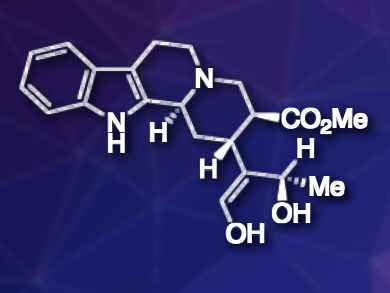Monoterpene indole alkaloids are a large and medically important group of natural plant products. Sarah O’Connor, John Innes Centre, Norwich, UK, and colleagues have discovered a novel monoterpene indole alkaloid (pictured) that they named “vitrosamine”.
The compound is produced in vitro through the action of an isolated short chain alcohol dehydrogenase from the medicinal plant Catharanthus roseus. This enzyme reduces the reactive central biosynthetic intermediate, strictosidine aglycone, to produce vitrosamine, which has never been described in the literature. Vitrosamine may be a “cryptic” product (only produced by the plant under certain conditions) or an “unnatural” natural product (not formed in vivo but observed in vitro).
The findings serve as a reminder of the large chemical diversity found in plants and of the potential for unlocking new diversity through enzyme discovery and synthetic biology efforts.
- Discovery of a short chain dehydrogenase from Catharanthus roseus that produces a novel monoterpene indole alkaloid,
Anna Stavrinides, Evangelos Tatsis, Thu-Thuy Dang, Lorenzo Caputi, Clare Stevenson, David Lawson, Bernd Schneider, Sarah O’Connor,
ChemBioChem 2018.
https://doi.org/10.1002/cbic.201700621




